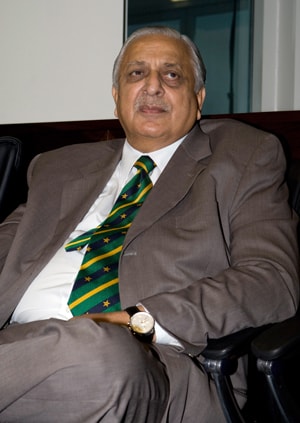Spot-fixing case: Player bans a sad reality, says PCB
The PCB has expressed its support for the process followed by the ICC tribunal that ended with Salman Butt, Mohammad Asif and Mohammad Amir receiving bans of 10, 7 and 5 years respectively for spot-fixing, calling the sanctions "regrettable and a sad reality which must be faced".
- Written by ESPNCricinfo Staff
- Updated: February 08, 2011 12:00 pm IST
 The PCB has expressed its support for the process followed by the ICC tribunal that ended with Salman Butt, Mohammad Asif and Mohammad Amir receiving bans of 10, 7 and 5 years respectively for spot-fixing, calling the sanctions "regrettable and a sad reality which must be faced".
The PCB has expressed its support for the process followed by the ICC tribunal that ended with Salman Butt, Mohammad Asif and Mohammad Amir receiving bans of 10, 7 and 5 years respectively for spot-fixing, calling the sanctions "regrettable and a sad reality which must be faced".
"The time from August last when spot-fixing came to light, has been an extremely painful one for Pakistan cricket," PCB chairman Ijaz Butt said. "I now hope that this unfortunate saga is put to rest and we can concentrate on cricket. We will continue to work with ICC on this sensitive matter in future also. We will also see how we can help the three players with their education and rehabilitation program."
The PCB also reiterated its commitment to dealing with the threat of corruption. "Like all my colleagues in the ICC I am determined to maintain the integrity of our sport," Ijaz Butt said. "This is fundamental."
Under the ICC's Anti-Corruption Code, the players can appeal to the Court of Arbitration for Sports (CAS) within 21 days of the verdict, something Amir has already said he plans to do.
Butt, who was captain during the series in England, received the maximum sentence but one charge against him - of batting out a maiden over during the Oval Test - was dismissed. However, he was found to have not disclosed an approach by Mazhar Majeed that he should bat the maiden over. The other charges that were upheld relate to the subsequent Lord's Test, where Amir and Asif were found to have bowled deliberate no-balls and Butt was penalized for being party to that.
The PCB initially provided the three players with legal support and refused to suspend them, eventually compelling the ICC to do so. That sparked another war of words between Butt and the ICC, the former claiming the latter had acted with undue haste as the police investigation was ongoing. Matters took a bizzare twist when Butt claimed there was "loud and clear talk" of England's players taking money to lose an ODI this summer. He was forced to apologise for that statement after the ECB threatened legal action and the whole affair prompted some within the ICC to consider the possibility of suspending Butt from his ICC directorship.
The ICC subsequently told the PCB that "it must act and be seen to be acting to uphold the zero-tolerance attitude to corruption in sport", and the board was given 30 days to conduct a thorough and far-reaching review of their "player integrity issues", which it did to the satisfaction of the ICC.
